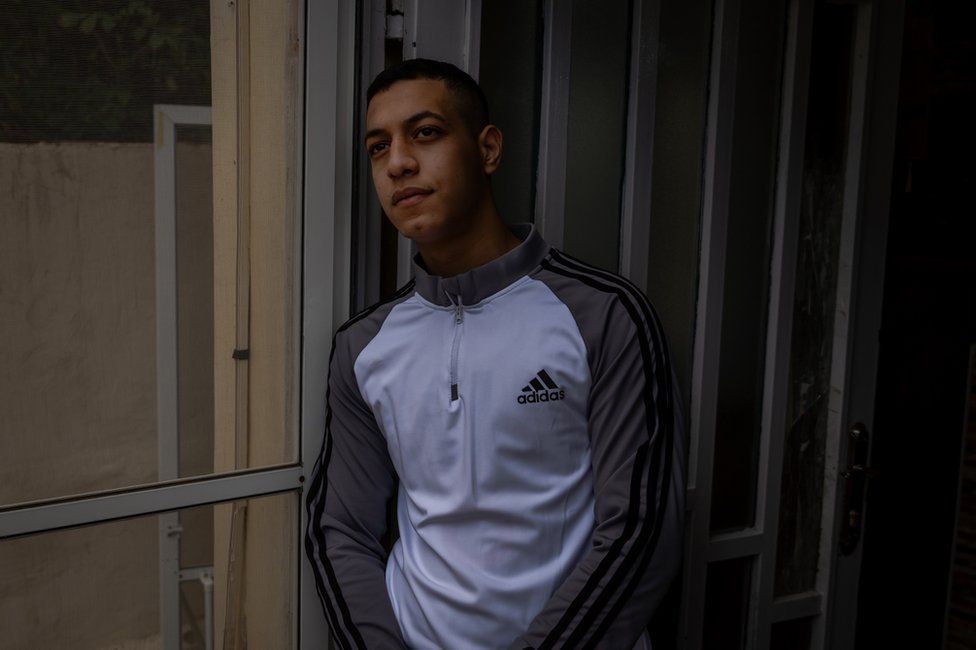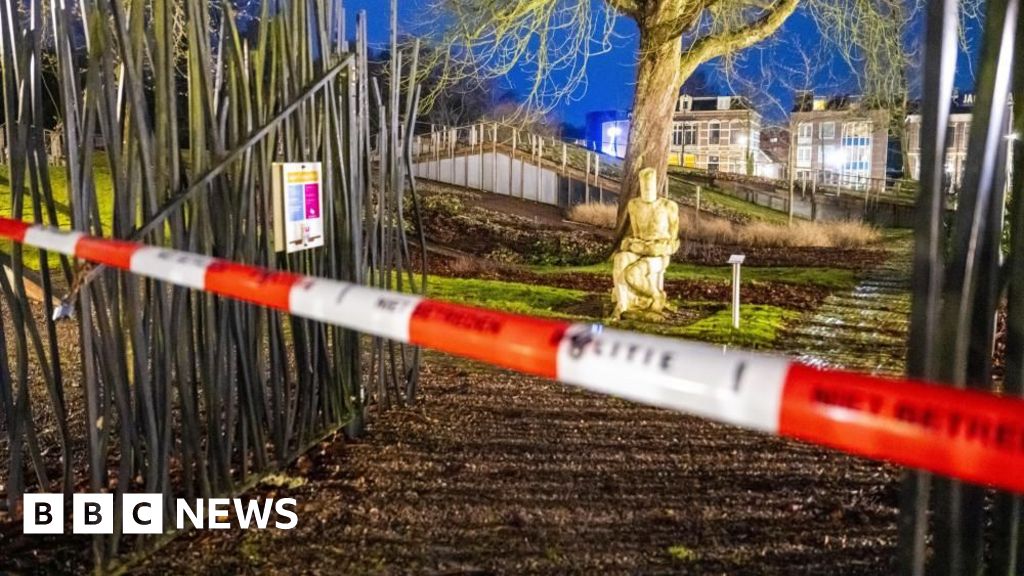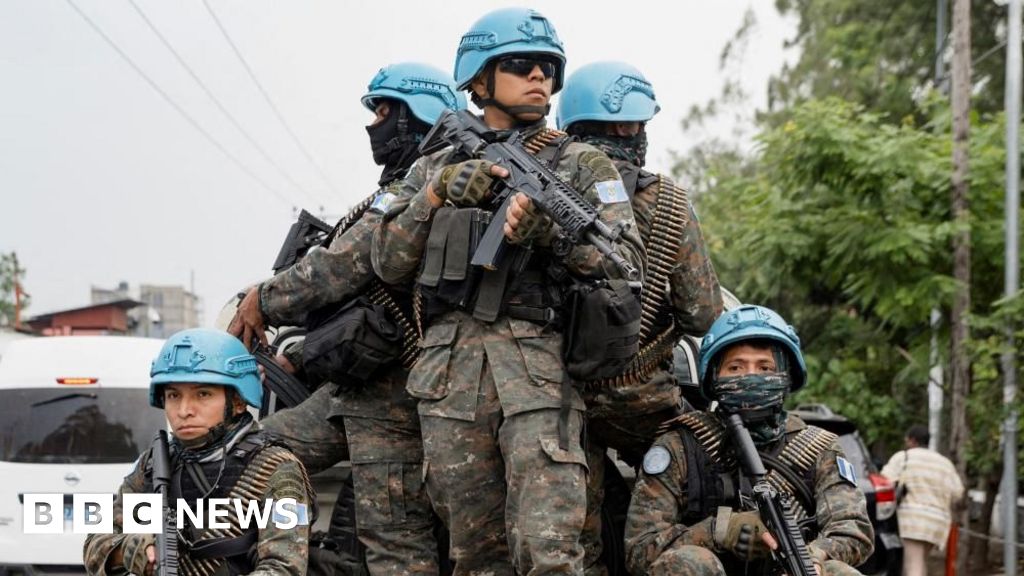ARTICLE AD BOX

Yazen Alhasnat, 17, the morning after his release from prison. "It is still possible to have hope," he said
By Joel Gunter
BBC News, West Bank
In a family home in Bethlehem, in the occupied West Bank, Yazen Alhasnat was sitting next to his mother rubbing sleep from his eyes.
The 17-year-old had been released from prison the night before, nearly five months after being arrested in a 4am Israeli military raid on the home.
Yazen had been held under "administrative detention" - a longstanding security policy, inherited from the British, that allows the Israeli state to imprison people indefinitely without charge, and without presenting any evidence against them.
"They have a secret file," Yazen said. "They don't tell you what's in it."
He was back at home because he was among the 180 Palestinian children and women released from prison by Israel in the recent exchange for hostages held by Hamas in Gaza.
But at the same time the Palestinian prisoners were being released, Israel was detaining people at its highest rate in years. In the weeks since 7 October, the number of people in administrative detention - already at a 30-year high of 1,300 - has shot up to more than 2,800.
Image source, Getty Images
Image caption,Israeli soldiers detain a young boy during demonstrators in the Hebron, 2022. Israel has been accused of heavy-handed tactics
When Yazen was released, his family was told not to publicly celebrate in any way or to talk to the media. The same instructions were given to the families of two other teenagers who spoke to the BBC about their experiences. But all three families said they wanted to highlight the issue of administrative detention.
Israel says that its use of the policy is compliant with international law and a necessary preventative measure to combat terrorism. Maurice Hirsch, a former director of military prosecutions for the West Bank, from 2013 to 2016, told the BBC that Israel was "not only meeting international law but far surpassing it", by allowing detainees to appeal and ensuring that their detentions were reviewed every six months.
But human rights groups say Israel's expansive use of the measure is an abuse of a security law not designed to be employed at such scale, and that detainees cannot effectively defend themselves, or appeal, because they have no access to the evidence against them.
"Under international law, administrative detention should be a rare exception," said Jessica Montell, the executive director of HaMoked, an Israeli human rights organisation that monitors detention of Palestinians.
"You are supposed to use it when there is a present danger and no other way to prevent that danger than detaining someone. But it is clear Israel is not using it that way. It is detaining hundreds, thousands of people, without charge, and using administrative detention to shield itself from scrutiny."
Musa Aloridat in his bedroom in Jericho, where Israeli soldiers fired a bullet into the wardrobe as they raided the house
Palestinians have been subject to administrative detention in this region since 1945, first under the British Mandate and then in the Occupied Palestinian Territory. The law has in some very rare instances been used against Israeli settlers, but it is overwhelmingly used to detain West Bank Palestinians, including children.
Administrative detainees are granted a hearing - at a military court, in front of an Israeli military judge - but the state is not required to disclose any of its evidence to the detainees or their lawyers. The detainees can then be sentenced to up to six months. But the six months can be extended indefinitely by the military court, meaning that administrative detainees have no real idea at any point how long they are going to be locked up.
"What really gets to you is the uncertainty," Yazen said, sitting in his living room. "Will you finish your six months and leave? Or will you be extended for a year, for two years?"
The detainees can mount an appeal, all the way up to Israel's Supreme Court, but with no access to the evidence against them, they have nothing to base it on. Palestinians who are formally tried in the military courts have more access to evidence, but the courts boast a roughly 99% conviction rate.
"Defending Palestinians in the military courts is an almost impossible task," said Jerusalem-based defence lawyer Maher Hanna.
"The entire system is designed to limit a Palestinian's capacity to defend himself. It imposes harsh constraints on the defence and relieves the state prosecutor of the burden of proof."
Israel's use of the policy in the West Bank had "crossed all lines - red, green, every colour", Yazen's mother Sadiah said.
"We are living under a parallel system of justice."
A photograph taken by Musa Aloridat's parents shows him being detained by the IDF following an early-morning raid
When 16-year-old Osama Marmesh was detained, he was pulled off the street and into an unmarked car, he said. So for the first 48 hours of Osama's detention, his father Naif had no idea where he was. "You call everyone you know to ask if they have seen your son," Naif said. "You don't sleep."
Osama asked repeatedly during his arrest for the charges against him, he said, but was told each time to "shut up".
When 17-year-old Musa Aloridat was arrested, in a 5am raid on his family home, Israeli forces pulled apart the bedroom he shared with his two younger brothers and fired a bullet into the wardrobe, smashing the glass, he said.
"They took him away in his underwear," Musa's father Muhannad said, holding up a picture on his phone. "For three days we knew nothing."
Neither Yazen, Osama nor Musa, nor their parents or lawyers, were shown any evidence against them during their months of detention. When Israel published lists of the detainees to be released in the recent exchanges, in the column detailing the charges, against Yazen, Osama and Musa's names there was only the vague line, "Threat to the security of the area".
Another version of the list said Yazen and Musa were suspected of being affiliated with Palestinian militant groups. When Osama was released, he was handed a brief charge sheet which said that on two occasions, months earlier, he had thrown a stone, "half the size of his palm", towards Israeli security positions.
Ofer Prison, where Yazen and Musa were held alongside hundreds of other administrative detainees are held.
Maurice Hirsch, the former director of military prosecutions, said that it would be wrong to draw any conclusions from the limited information available. "There's a very stark difference between the openly available evidence against these terrorists and what the intelligence information carries," he said.
"We see administrative detention being used by the Americans in Guantanamo, so we know that this measure is internationally recognised and accepted," he added. "And since this is an internationally accepted measure, why should it be only Israel that is prevented from using it, when we are dealing with probably the highest terror threat that anyone has ever seen?"
In the end, Yazen, Osama and Musa spent between four and seven months in prison. All three said that conditions had been relatively comfortable until the Hamas attack on 7 October, when their bedsheets, blankets, extra clothes and most of their food rations were removed, and all communication with the outside world was cut off, in what they described as collective punishment for the attack.
Other detainees have alleged that they were beaten, tear-gassed or had dogs set on them.
The Israeli Prison Service confirmed that it had put the prisons into emergency mode and "reduced the living conditions of the security prisoners" in response to the Hamas attack.
Osama Marmesh at his home in the West Bank. "All countries are standing with them, we are alone," he said.
Yazen, Osama and Musa were all released early, because the exchange for Israeli hostages prioritised women and children. But, according to the most recent numbers from the prison service, there are still 2,873 people being held under administrative detention in Israeli jails.
The day after he got home, Musa was back in his room, where he had been grabbed from his bed by the Israeli military four months earlier. The wardrobe doors, smashed by a bullet, had been taken off to be replaced, but the room had otherwise been put back together carefully by his parents. Musa had expected to be in prison much longer, he said. His lawyer had told him there was a 90% chance his detention would be extended.
All three boys said they wanted to try to finish school. But living under the constant threat of being locked up again was its own "kind of psychological detention", Musa said.
"They released us into a bigger prison", Yazen said.
"There is no peace," Yazen's mother said, looking over at him. "They can take you at any time."
Muath al-Khatib contributed to this report. Photographs by Joel Gunter.

 1 year ago
24
1 year ago
24








 English (US) ·
English (US) ·